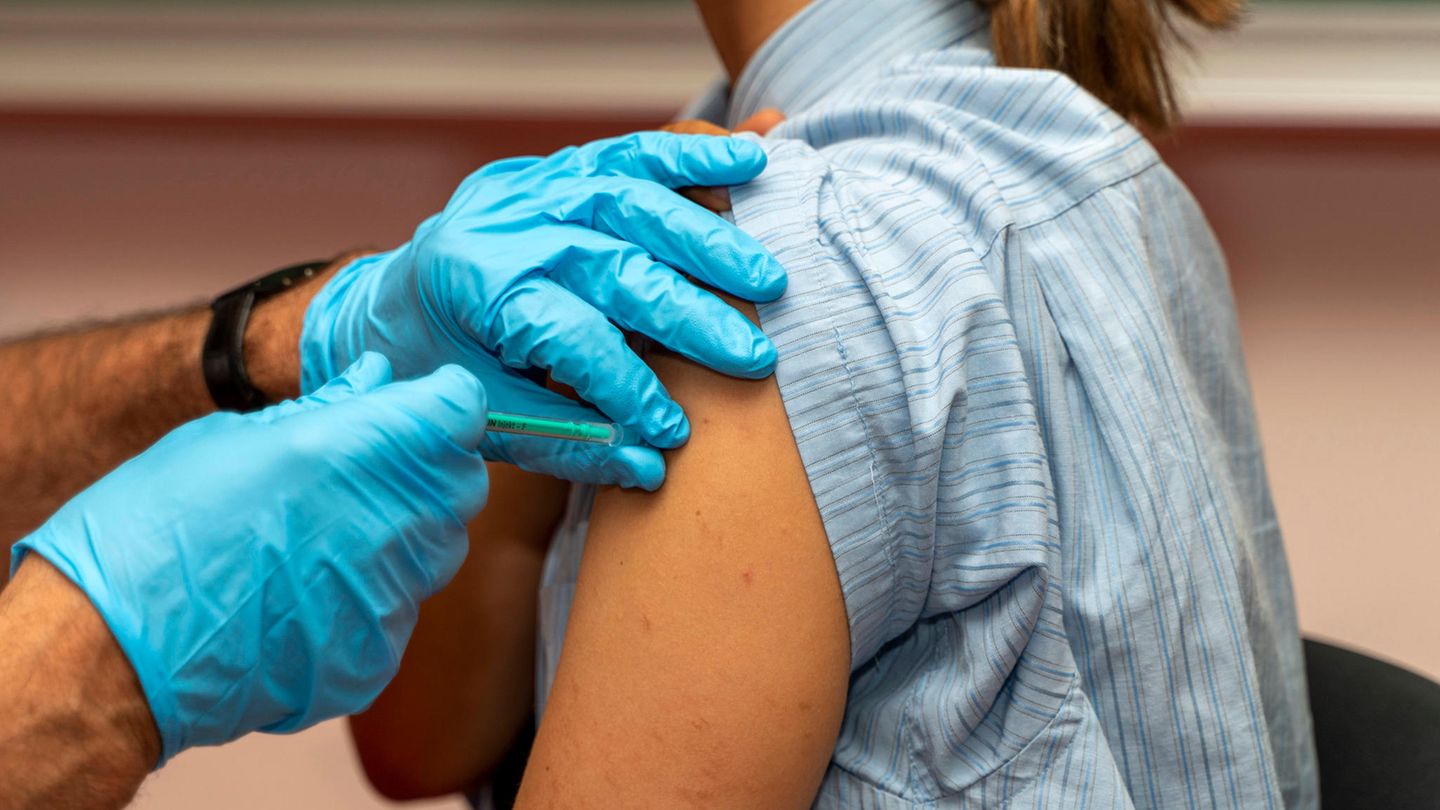Although people who have been vaccinated can also become infected with the coronavirus, the syringe helps. In any case, you get sick less often.
Fully vaccinated against Corona and still infected or even sick: The number of such cases is increasing and unsettling many people. But such infections are not a sign that the syringes are not working, as experts emphasize. Those who were vaccinated would still have a significantly lower risk of falling ill or even dying. In fact, those who have not yet been vaccinated must worry about such infections from vaccinated people.
It comes as no surprise to scientists that vaccinated people can become infected at all. “We knew from the beginning that the vaccination was not 100 percent effective: Even in the approval studies, completely vaccinated people were infected,” explains Carsten Watzl, immunologist at the Leibniz Institute for Labor Research at the Technical University of Dortmund. Because of this, of course, the more people who were immunized, the more breakthrough infections would occur.
Infection immunologist Leif Erik Sander from the Berlin Charité also emphasizes that a certain number of such infections was to be expected: “Especially with a respiratory pathogen that affects the upper airways, multiplies there and is also passed on from there, it is difficult to find one establish sterile immunity. ” One speaks of this when both the infection with a pathogen and its transmission are completely prevented.
Breakthrough vaccination – what is it actually?
The Robert Koch Institute (RKI) defines a probable vaccination breakthrough as a Sars-CoV-2 infection with disease symptoms that was diagnosed in a fully vaccinated person using PCR or pathogen isolation. Complete vaccination protection is assumed if at least two weeks have passed after a completed series of vaccinations – i.e. two doses of the Moderna, Biontech or Astrazeneca vaccine or one dose of the Johnson & Johnson vaccine. According to the RKI, there were 13,360 symptomatic breakthroughs in vaccination between the start of the vaccination campaign and August 17. By then, 48 million people nationwide had been fully vaccinated. However, the two weeks after the last vaccination had not yet passed for all of them.
Infections of completely vaccinated persons that run without symptoms cannot be recorded well: “Such infections would only be detected by chance because vaccinated persons can hardly be tested,” explains Watzl, who is also Secretary General of the German Society for Immunology. And even with symptomatic infections, there is certainly still an unreported number: “With vaccinated people, there is a likelihood that they do not associate symptoms with corona, therefore do not see a doctor and do not get tested.”
The number of vaccination breakthroughs is an important measure to determine how effective the vaccinations actually provided protection. “Here we see two things: First, that the number of these breakthrough infections still makes up the smaller part of the total infections, although the group of the vaccinated forms the larger part. And from this one can deduce that the vaccination protects against the infection.”
High protection against severe gradients
On the other hand, infections were significantly milder in vaccinated people, according to the immunologist: “In Germany we are talking about protection against symptomatic infection that is between 80 and 90 percent, and in the case of severe infections even higher. This explains why almost exclusively those in intensive care units Unvaccinated lie. “
This fits the results of a preprint study (a work that has not been checked by experts) from India with 495 partially or fully vaccinated people and 666 unvaccinated people, all of whom were hospitalized with Covid 19. Both the severity of the disease and the need for ventilation support were significantly lower in the vaccinated group, although there were more people of older age and those with risk factors in this group. In addition, the mortality rate was significantly lower among the fully vaccinated. Last but not least, since the start of the vaccination campaign in Germany, the RKI has listed a total of 1871 deaths as a result of Covid-19 in the group of 18 to 59 year olds, but only one death of a fully immunized person in the same age group.
Sander also emphasizes that the risk of becoming seriously ill is significantly lower in people who have been completely vaccinated. However, how long ago the vaccination was and whether you belong to a risk group play a role. For example, a study from Israel recently showed that only 6 out of 152 patients who contracted Covid-19 despite being vaccinated were previously healthy. All of the others had severe previous illnesses, including high blood pressure, diabetes, chronic kidney failure, cancer, and heart or lung ailments. Another factor was a weakened immune system, for example due to an organ transplant or chemotherapy.
Age is also an important aspect. The RKI report states: “Of the 335 Covid-19 cases with vaccine breakthroughs who died, 279 (84 percent) were 80 years and older.” This reflects the generally higher risk of death – regardless of the effectiveness of the vaccines – for this age group.
Nonetheless, there also seem to be vaccination specifics for people over the age of 60. Watzl reports that there are elderly people – or patients with a weakened immune system – who have been vaccinated twice but have developed no or only weak immunity. “Although these people are considered vaccinated and protected, they actually have little to no protection and a corresponding risk of becoming seriously ill with an infection.” The proportion of such “vaccination failures” is probably five percent among the elderly.
“Booster” for the elderly and those at risk
In addition, adds Sander, that on average fewer antibodies are formed in older people after a vaccination, and their levels are likely to drop again more quickly. His research group will shortly publish more precise figures in a preprint. Since older people were also vaccinated first and their vaccinations are correspondingly far back, the recommendation of a third “booster” vaccination for these groups as well as for those particularly at risk is “absolutely understandable and medically indicated,” says Sander. In fact, Bavaria began to give third-party vaccinations to people from risk groups in mid-August, and the other federal states are to follow suit from September.
Such a booster vaccination could also offer better protection against new virus variants such as the delta variant, which is currently considered to be particularly pandemic-driving. This is not only considered to be more contagious. Studies have also shown that the viral load in vaccinated infected people is, at least initially, just as high as in unvaccinated people. However, it was only measured what amount was present. “The studies did not examine whether it was also a contagious virus. But that is decisive for the question of whether someone can pass it on,” explained the molecular biologist Emanuel Wyler from the Max Delbrück Center for Molecular Medicine in Berlin.
“There can be differences in the course of the viral load over time and when it comes to the question of how viable and infectious this virus is, but: an infected person who is vaccinated is certainly not” not “contagious”, emphasizes immunologist Watzl. This also made herd immunity almost impossible: “Individuals who have been vaccinated are certainly much better protected than those who have not been vaccinated, but they in turn can no longer rely on being protected because everyone around them is vaccinated.” Sander also warns, especially in view of the Delta variant, that vaccinated people could unknowingly spread the virus: “That is why vaccinated people should continue to wear a mask in certain areas such as local public transport and have themselves tested regularly if they work in sensitive areas.”
The testing of vaccinated persons would also improve the data situation on vaccination breakthroughs, adds Watzl, because further studies are necessary for more precise findings on these – as well as on the question of whether breakthrough infections can trigger Long Covid Syndrome. Sander considers the corresponding risk to be rather low, but no reliable statements could yet be made on this.
It is much clearer, however, according to the infectiologist, that we would all come into contact with the virus – be it Delta or another variant – by the end of next year: “Either we are then vaccinated so that this contact acts like a vaccination booster and we notice little or nothing of the infection, or we are not vaccinated and have first contact with the virus – and with it the risk of becoming seriously ill. “




